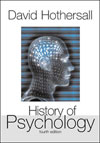

 History of Psychology, 4/e German Psychologists of the Nineteenth and Early Twentieth Centuries Multiple Choice |
 2004 McGraw-Hill Higher Education
2004 McGraw-Hill Higher EducationAny use is subject to the Terms of Use and Privacy Notice.
McGraw-Hill Higher Education is one of the many fine businesses of The McGraw-Hill Companies.